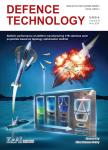A comprehensive review of radiation effects on solder alloys and solder joints
作者机构:Department of PhysicsCentre for Defence Foundation StudiesUniversiti Pertahanan Nasional MalaysiaKem Sungai BesiKuala Lumpur 57000Malaysia Department of Mineral and Geoscience MalaysiaMineral Research CentreJalan Sultan Azlan ShahIpoh 31400PerakMalaysia
出 版 物:《Defence Technology(防务技术)》 (Defence Technology)
年 卷 期:2024年第39卷第9期
页 面:86-102页
核心收录:
学科分类:080503[工学-材料加工工程] 08[工学] 0805[工学-材料科学与工程(可授工学、理学学位)] 0802[工学-机械工程] 080201[工学-机械制造及其自动化]
基 金:fully supported by a Tabung Amanah Pusat Pengurusan Penyelidikan dan Inovasi (PPPI) grant (UPNM/2023/GPPP/SG/1) Universiti Pertahanan Nasional Malaysia (UPNM) for funding this study
主 题:Defence technology Solder alloy Solder joints Radiation-induced effect Microstructure Mechanical properties
摘 要:In the realm of military and defence applications, exposure to radiation significantly challenges the performance and reliability of solder alloys and joints in electronic systems. This comprehensive review examines radiation-induced effects on solder alloys and solder joints in terms of microstructure and mechanical properties. In this paper, we evaluate the existing literature, including experimental studies and fundamental theory, to provide a comprehensive overview of the behavior of solder materials under radiation. A review of the literature highlights key mechanisms that contribute to radiation-induced changes in the microstructure, such as the formation of intermetallic compounds, grain growth,micro-voids and micro-cracks. Radiation is explored as a factor influencing solder alloy hardness,strength, fatigue and ductility. Moreover, the review addresses the challenges and limitations inherent in studying the effects of radiation on solder materials and offers recommendations for future research. It is crucial to understand radiation-induced effects on solder performance to design robust and radiationresistant electronic systems. A review of radiation effects on solder materials and their applications in electronics serves as a valuable resource for researchers, engineers, and practitioners in that field.



